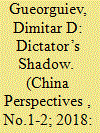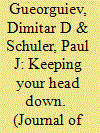| Srl | Item |
| 1 |
ID:
162084


|
|
|
|
|
| Summary/Abstract |
President Xi Jinping is arguably the most powerful Chinese leader since Chairman Mao. Recent constitutional revisions and a midterm leadership reshuffle has only substantiated the fear that Xi, like Mao, has no intention of handing over power to a future successor. Does Xi’s rise signal an end to collective leadership and does a stronger president translate into a weaker party? In this article, I review the methods by which Xi has come to consolidate power as well as the implications for Chinese elite politics in the future. Drawing insights from the comparative literature, I question the zero-sum relationship between executive and institutional strength. Although Xi has certainly amassed unprecedented personal power, it has not necessarily come at the expense of the Party. Instead, the dangers of Xi Jinping’s power grab are more likely to result from a chilling effect on dissenting opinions and thinning out of the leadership pipeline, each of which is likely to undermine governing capacity over the medium to long-term.
|
|
|
|
|
|
|
|
|
|
|
|
|
|
|
|
| 2 |
ID:
145829


|
|
|
|
|
| Summary/Abstract |
During recent party congresses in China and Vietnam, two highly anticipated candidates for promotion were sidelined. In China, Bo Xilai was arrested for corruption and stripped of his party membership. In Vietnam, Nguyen Ba Thanh remained a provincial leader with little opportunity for promotion to the Politburo. Existing arguments about promotions under authoritarian rule are unable to explain these outcomes. In particular, both candidates were competent and well connected. This cuts contrary to the expectations of both performance-based promotion and factional promotion theories. We argue that these candidates were sidelined due to a previously under-theorized factor in promotion contests—their ability to mobilize personal followings. Amidst a literature that has focused almost exclusively on intra-elite conflict, we argue that elite–mass linkages are critical. In particular, the public profile of top leaders is important for regime legitimacy and mobilization. However, when individuals become exceptionally well known they become threats to the single-party system. We test this argument on promotions in China's 18th Party Congress in 2012 and Vietnam's 11th Party Congress in 2011, using original data on Internet search queries and media coverage among contenders for promotion. Our approach offers new insights into the strategies authoritarian politicians use to stay afloat as well as the mistakes that sink them when competing for power under one-party rule.
|
|
|
|
|
|
|
|
|
|
|
|
|
|
|
|